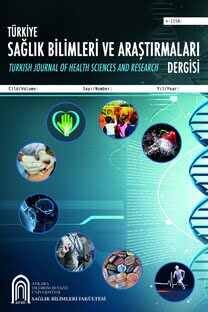Covid-19 Pandemisinde Emziren Anne Olmak: Olgu Sunumu
Bu olgu sunumu, 36 yaşında bir annenin Covid-19 pandemisinde ilk emzirme sürecini, yaşadığı meme sorunlarını ve bakımı için uyguladığı geleneksel yöntemleri, duygu ve düşüncelerini kapsamaktadır. Bu veriler anne ile Mayıs 2022 tarihinde yüz yüze görüşme tekniği ile toplanmış ve annenin ifadeleri değiştirilmeden olgu sunumuna eklenmiştir. Anne S.A, emzirme konusunda bilgi eksikliği nedeniyle emzirme sürecinde meme ucu çatlağı ve mastit gibi meme sorunları yaşamıştır. Şikayetleri devam eden anne bu süreçte korona virüs hastalığına yakalandığı için tekrardan hastaneye başvuramamış ve online emzirme danışmanlığı almaya başlamıştır. Anne online olarak aldığı emzirme danışmanlığından olumlu sonuç aldığını, online danışmanlık sonrası emzirme yöntemlerini öğrendiğini, sorunlarının çözüldüğünü ve emzirmeyi sürdürdüğünü bildirmiştir. Pandemi sürecinde gebelik, doğum ve doğum sonrasında olan anneler olumsuz etkilenmiştir. Olgudan çıkarılacaklar, pandemi gibi durumlarda emzirmenin sürdürülmesinde online emzirme gibi farklı yöntemlerin kullanılmasının hizmetin sürekliliği açısından önemini göstermektedir.
Being a Breastfeeding Mother in The Covid-19 Pandemic: Case Report
This case report covers the first breastfeeding process of a 36-year-old mother during the Covid-19 pandemic, her breast problems and traditional methods of care, feelings and thoughts. These data were collected with the mother-to-face interview technique and added to the case report without changing the mother's expressions. Due to the lack of knowledge about breastfeeding, Anne S.A experienced breast problems such as nipple cracks and mastitis during breastfeeding. The mother, whose complaints continued, could not apply to the hospital again because she caught the corona virus disease in this process and started to receive online breastfeeding counseling. The mother reported that she received positive results from the online breastfeeding counseling, that she learned breastfeeding methods after the online counseling, that her problems were resolved and that she continued breastfeeding. During the pandemic process, mothers who were pregnant, giving birth and postpartum were adversely affected. What will be taken out of the case shows the importance of using different methods such as online breastfeeding in the continuation of breastfeeding in cases such as pandemics for the continuity of the service.
Keywords:
Breast feeding, COVID-19, midwifery,
___
- 1. World Health Organization, Coronavirüs (COVID-19) [İnternet]. 2021. Erişim Linki: https://www.who.int/health-topics/coronavirus#tab=tab_1.
- 2. Wang CL, Liu YY, Wu CH, Wang CY, Wang CH, Long CY. Impact of Covid -19 on pregnancy. Int J Med Sci, 2021; 18(3):763-767.
- 3. Rasmussen SA, Smulian JC, Lednicky JA, Wen TS, Jamieson DJ. Coronavirus Disease 2019 (COVID-19) and pregnancy: what obstetricians need to know. Am J Obstet Gynecol. 2020;222(5):415-426. doi: 10.1016/j.ajog.2020.02.017.
- 4. World Health Organization Q&A on COVID-19, pregnancy, childbirth and breastfeeding.World Health Organization. [İnternet]. 2020. Erişim Linki: https://www.who.int/news-room/q-a-detail/q-a-on-covid-19-and-pregnancy-and-childbirth
- 5. Chen H, Guo J, Wan, C, Luo F, Yu X. Zhang,W. et al. Clinical characteristics and intrauterine vertical transmission potential of COVID-19 infection in nine pregnant women: a retrospective review of medical records. The Lancet 2020;395(10226):809-15.
- 6. Fan C, Lei D, Fang C, Li C, Wang M, Liu Y. et al. Perinatal Transmission of 2019 Coronavirus Disease-Associated Severe Acute Respiratory Syndrome Coronavirus 2: Should We Worry? Clin Infect Dis. 2021;72(5):862-864. doi: 10.1093/cid/ciaa226.
- 7. Stower H. Lack of maternal-fetal SARS-CoV-2 transmission. Nat Med. 2020;26(3):312. doi: 10.1038/s41591-020-0810-y. PMID: 32161408; PMCID: PMC7096028.
- 8. Yu Y, Li Y, Hu Y, Li B, Xu J. Breastfed 13 month-old infant of a mother with COVID-19 pneumonia: a case report. Int Breastfeed J. 2021;6;15(1):68.
- 9. Salvatore, CM, Han JY, Acker KP, Tiwari P, Jin J, Brandler M, et al. Neonatal management and outcomes during the COVID-19 pandemic: an observation cohort study. Lancet Child Adolesc Health. 2020;4(10):721-727.
- 10. Peng S, Zhu H, Yang L, Cao L, Huang X, Dynes M, et al. A study of breastfeeding practices, SARS-CoV-2 and its antibodies in the breast milk of mothers confirmed with COVID-19. Lancet Reg Health West Pac. 2020;4:100045. doi: 10.1016/j.lanwpc.2020.100045.
- 11. Motrico, E., Mateus, V., Bina, R., Felice, E., Bramante, A., Kalcev, G, et al. Good practices in perinatal mental health during the COVID-19 pandemic: a report from task-force RISEUP-PPD COVID-19. Clínica y Salud, 2020;31(3), 155-160.
- 12. WHO, World health Organization. Guideline: counseling of women to improve breastfeeding practices. 2018. [İnternet]. Erişim Linki: https://www.who.int/publications/i/item/9789241550468
- 13. Başer, A., & Sezer, H., Şahin, H. (2020). Covid 19 pandemi sürecinde anne sütü ve emzirme eğitimi yönetimi. DENT, 28(29).
- 14. Hull, N., Kam, R. L., Gribble, K. D., Hull, N. (2020). Title: Providing breastfeeding support during the COVID19 pandemic: Concerns of mothers who contacted the Australian Breastfeeding Association. medRxiv., 1–32. https://doi.org/: https://doi.org/10.1101/2020.07.18.20152256
- 15. Şensoy, F., & Koçak, D. Y. (2021). Emzirme danışmanlığında güncel yaklaşımlar. Ordu Üniversitesi Hemşirelik Çalışmaları Dergisi, 4(3), 427-435.
- 16. Lau Y, Htun TP, Tam WS, Klainin-Yobas P. (2016). Efficacy of e-technologies in improving breastfeeding outcomes among perinatal women: a meta-analysis. Maternal & Child Nutrition, 12(3), 381-401.
- ISSN: 2651-3005
- Başlangıç: 2018
- Yayıncı: Ankara Yıldırım Beyazıt Üniversitesi
Sayıdaki Diğer Makaleler
Konjenital Nörolojik Problemi Olan Çocuklarda Görülen Beslenme Sorunları ve Çözüm Önerileri
Bekâr Stresleri Ölçeği-Genç Formu’nun Doğrulayıcı Faktör Analizi ve Ölçüt-Bağımlı Geçerliği
Kamile Bahar AYDIN, Nailakhanim RUSTAMOVA
Covid-19 Pandemisinde Emziren Anne Olmak: Olgu Sunumu
Sibel KÜÇÜK, Perver KARŞIGİL, İlknur TÜRKYILMAZ
Akne Vulgaris’te Beslenmenin Etkisi
Çok Amaçlı Optimizasyon Yaklaşımı ile Anne ve Çocuk Sağlığı Üzerine Bir İnceleme
Üstün Yetenekli Çocuklar ve Aileleri İçin Okul Sosyal Hizmeti İhtiyacı
